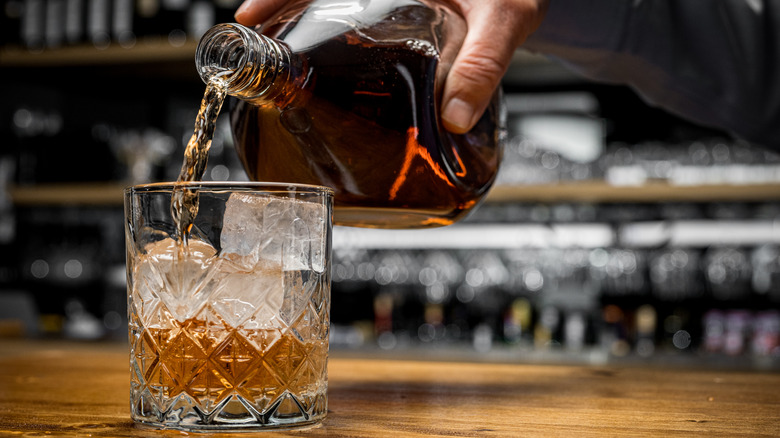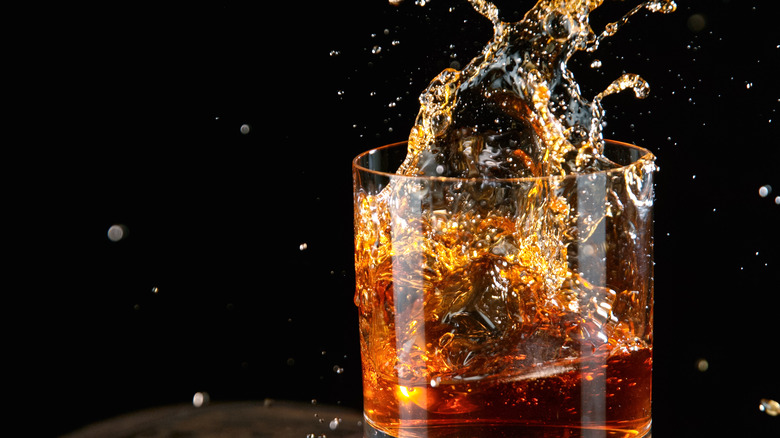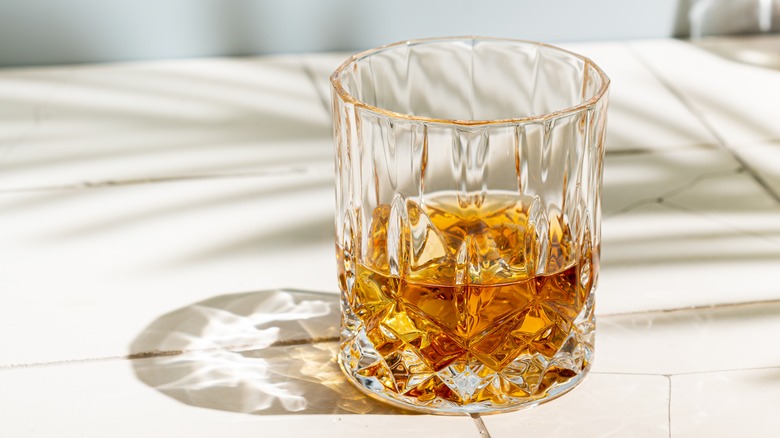Scientists Weigh In On How Much Water Is Too Much In Your Whiskey
Are you a whiskey connoisseur looking to savor the full flavor of your favorite spirit? No, we're not talking about exploring some bizarre whiskey flavors. We're talking about perfecting the art of dilution, which you'll soon find out is a delicate process that requires balance and precision.
While adding a splash of water can enhance the aroma and taste of a fine whiskey, this addition must be carefully measured. According to a study led by Washington State University, diluting your whiskey by more than about 20% could significantly alter its character, resulting in a less enjoyable experience for the seasoned sipper.
WSU assistant professor and the study's senior author Tom Collins told WSU Insider, "If you want to enjoy a specific whiskey, this suggests that you don't want to dilute it by more than about 20% ... By the time you get to 60/40 whiskey to water ... they begin to smell the same, and that's not really what you're looking for."
Intrigued? Stick with us because we're diving into the science behind whiskey dilution and exploring the factors that can influence how much water should be added. Get ready to indulge in your preferred drink's nuanced flavors and aromas.
Of whiskey and water: a tale of taste and transformation
Water is a powerful instrument in whiskey production and affects every aspect of its development. It is used to dilute the whiskey before being bottled or added to the fermentation process — all affecting the final taste.
However, whiskey connoisseurs worldwide have learned how to alter their favorite whiskeys by adding a drop or two of water pre-consumption. And there's a simple scientific explanation behind how this can affect the spirit's flavor profile: Whiskey is made of ethanol (alcohol) and water molecules. When you add more water to the glass, it alters the entire makeup of the mix.
Calum Fraser of Bowmore, a distillery that produces Scotch whisky, told Food & Wine, "Due to molecule-by-molecule variation in solubility in water, this can cause certain flavors to be more 'visible' to the nose, particularly those that are drowned by the alcohol at higher strength."
But beware of that fine line between adding just the right amount of water and adding too much. According to the aforementioned study by researchers at Washington State University, adding more than 20% water to your whiskey can actually make most whiskies taste the same.
This means that if you've paid top dollar for an expensive whiskey at a high-end bar, you'll want to ensure you're not diluting it too much, so you can really sip on the spirit and enjoy every flavor note as you swirl it around in your mouth. Add too much water, and you might as well be sipping well whiskey.
Should you add water to all whiskey?
This question (like the question of single malt vs. blended whiskey) has been debated for a long time, with some claiming that adding water dismantles the precious flavors of the barrel. However, here's a hot take from the whiskey experts: It all depends on the age of your whiskey.
When it comes to very old and precious drops, like well-aged Scotch whiskies that have been maturing for decades, it's highly unlikely that you'd need to add even a drop of water. These whiskies have spent years in the barrel, slowly developing their unique, complex flavor profiles.
But what about younger whiskies? In the interview with Food & Wine, Calum Fraser revealed that "The addition of water for these lower aged expressions reduces the intensity of the alcohol, unmasking all the flavors for assessment." As a rule of thumb, you want to add enough water to eliminate the alcohol burn. Doing so helps to release more aromatic compounds, and it can also dilute the alcohol and open up the flavors.
However, as long as you're abiding by the now scientific rule of 20%, it really comes down to personal preference. So, go ahead and add a few drops of water to your whiskey, and watch as its flavors become more pronounced and enjoyable. Just remember: Science shows too much water can also be a problem, so add it gradually until you reach the perfect flavor balance.


